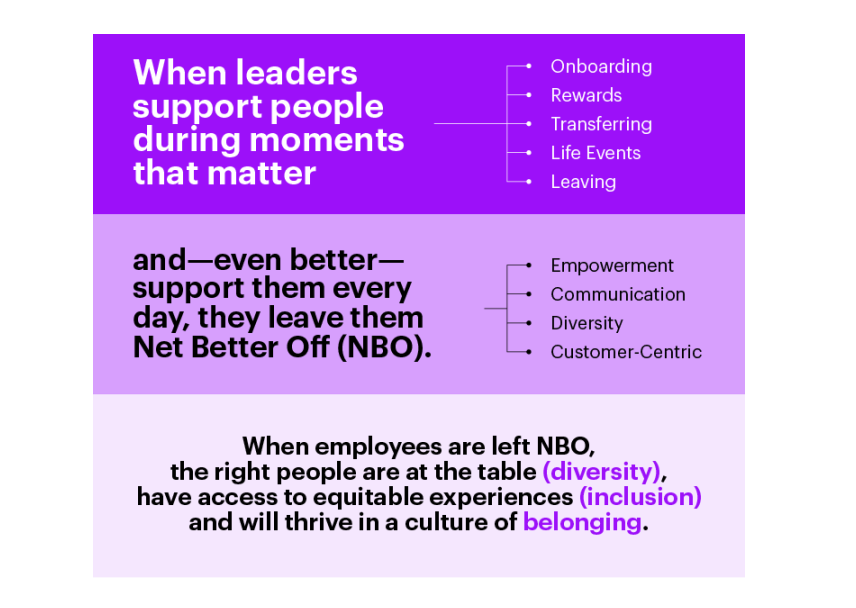Creating a culture of belonging within an organization is increasingly recognized as a crucial element of employee engagement, satisfaction, and overall business success. Accenture’s insights highlight that fostering a sense of belonging can significantly impact employee performance and retention. By prioritizing belonging, organizations can not only improve their workplace culture but also drive better business outcomes. Here’s how to build a belonging culture for your employees, guided by the principles of the Net Better Off strategy.
Understanding the Net Better Off Strategy
Accenture’s Net Better Off strategy emphasizes the importance of creating environments where employees feel they are valued and their well-being is prioritized. This approach goes beyond traditional employee engagement initiatives by focusing on holistic measures of success and fulfillment. The strategy is built on three core pillars:
- Inclusivity and Equity: Ensuring that all employees have equal access to opportunities and feel included in the organizational culture.
- Personal Well-being: Supporting employees in achieving work-life balance and personal growth.
- Organizational Culture: Developing a workplace culture that aligns with the values and expectations of employees, fostering a sense of belonging and purpose.
Building a Culture of Belonging
- Foster Inclusivity and Equity
- Diverse Leadership: Having diverse leadership teams is critical in setting the tone for inclusivity. Leaders should actively champion diversity and demonstrate commitment to equity in their decision-making processes.
- Bias Training: Implement regular training programs to address and mitigate unconscious biases. This training should be ongoing and integrated into the organizational culture.
- Inclusive Policies: Develop and enforce policies that promote equity in recruitment, promotions, and rewards. Ensure that these policies are transparent and communicated clearly to all employees.

- Support Personal Well-being
- Flexible Work Arrangements: Offer flexible work options such as remote work, adjustable hours, and family leave to help employees manage their personal and professional responsibilities effectively.
- Mental Health Resources: Provide access to mental health resources, including counseling services, wellness programs, and stress management workshops.
- Career Development: Invest in career development opportunities that help employees grow professionally and personally. This includes mentorship programs, skill development workshops, and clear career progression paths.
- Cultivate a Positive Organizational Culture
- Recognize Contributions: Regularly acknowledge and celebrate the achievements and contributions of employees. Recognition can be both formal and informal, such as through awards, shout-outs in meetings, or personalized messages of appreciation.
- Build Trust: Create an environment where employees feel comfortable voicing their opinions and concerns. This involves transparent communication, consistent feedback, and a commitment to addressing issues promptly.
- Encourage Community Building: Facilitate team-building activities and social events that allow employees to connect on a personal level. This can help strengthen relationships and foster a sense of community within the workplace.
Implementing the Net Better Off Strategy
- Assess Current Culture
- Develop and Communicate a Clear Strategy
- Define Goals: Establish clear, actionable goals related to belonging and inclusivity. Ensure that these goals are aligned with the broader organizational strategy and are communicated to all employees.
- Create an Action Plan: Develop a detailed action plan that outlines the steps needed to achieve your goals. This plan should include timelines, responsible parties, and metrics for measuring success.
- Monitor and Adapt
- Track Progress: Regularly monitor the effectiveness of your initiatives and adjust your approach as needed. Use employee feedback and performance data to make informed decisions about changes and improvements.
- Celebrate Successes: Recognize and celebrate milestones and successes related to building a culture of belonging. This helps maintain momentum and demonstrates the organization’s commitment to its values.

counter the Big Quit with high retention strategies
Build a Belonging Culture: A Conclusion
Building a culture of belonging is not just a strategic initiative but a fundamental aspect of creating a positive and productive workplace. By implementing the Net Better Off strategy, organizations can ensure that employees feel valued, included, and supported in their personal and professional growth. Prioritizing inclusivity, personal well-being, and a positive organizational culture will not only enhance employee satisfaction but also drive better business outcomes.
As organizations continue to evolve, creating a sense of belonging will become increasingly important in attracting and retaining top talent. By embracing these strategies and fostering a culture where employees truly feel they belong, companies can achieve long-term success and build a resilient and engaged workforce.
LMS For A Belonging Culture In Your Organization
Looking for tools to support a culture of belonging? Offer all employees inclusive learning opportunities with an LMS platform. By providing access to continuous learning and equal opportunities, an LMS helps create a more engaged, supported, and connected workforce.
Book a free demo now and learn about the LMS features that drive a culture of belonging in your organization.











